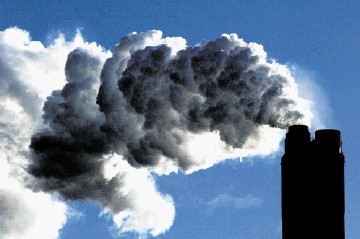
A world without cars, planes, ships and factories powered by fossil fuels would have to become a reality in the next 40 years to have a realistic hope of keeping global warming below safe levels, scientists claim.
Researchers used climate simulations to predict the fate of the planet under different fossil fuel scenarios.
They found there was a 64% chance of pegging global warming below the critical threshold of 1.5C above pre-industrial levels – but only if a massive programme to rid the world of fossil fuels started now.
Under this scenario, petrol and diesel-driven cars, aircraft and ships run on fossil fuels, and carbon-emitting power plants and factories would have to become history over a period of four decades.
They would need to be replaced by zero-carbon alternatives such as electric cars, modern-style sailing vessels and renewable energy sources.
A big question mark hangs over the future of commercial air travel.
Currently there is no practical alternative to kerosene aviation fuel, despite experiments involving solar powered flight and hydrogen.
Delaying action until 2030 reduced the chances of keeping a 1.5C lid on global warming to below 50%, said the scientists writing in the journal Nature Communications.
Global warming above 1.5C increases the likelihood of dangerous impacts such as severe droughts and sea levels high enough to flood coastal cities, according to experts.
But even the radical programme of fossil fuel phase-out outlined in the new study relies on no large-scale climate “tipping points” being breached in the coming decades.
Crossing tipping points such as the melting of polar permafrost or the sudden release of methane trapped on the ocean floor could put the Earth into a warming spiral from which there is no escape.
Under the 2015 Paris Agreement, world leaders pledged to limit global warming to 2C above pre-industrial levels and “pursue efforts” to achieve a lower target of 1.5C.
The authors of the new study, led by Dr Christopher Smith from the University of Leeds, wrote: “Although the challenges laid out by the Paris Agreement are daunting, we indicate 1.5C remains possible and is attainable with ambitious and immediate emission reduction across all sectors..”
They concluded: “This is important information, as it shows that whether global mean temperature increase will be kept to below 1.5C depends on societal choices made today and emissions reductions implemented over the coming decades.”
Other experts described the findings as “insightful” and “welcome” and offered a reason to be optimistic about the future, but only if immediate action is taken.
Mark Maslin, professor of climatology at University College London, warned: “Each year we fail to cut global emissions will make it more unlikely that we can keep global warming below 1.5C.”
Professor Dave Reay, chair in carbon management at the University of Edinburgh, said: “The risks of climate curve balls, like warming-induced faltering of land and ocean carbon sinks or huge belches of Arctic methane, are still out there, but the message of this new study is loud and clear: act now or see the last chance for a safer climate future ebb away.”
Dr Phillip Williamson, from the University of East Anglia, said the study provided a further incentive “to make the necessary changes with the requirement for nothing new that burns coal, oil or gas”.
